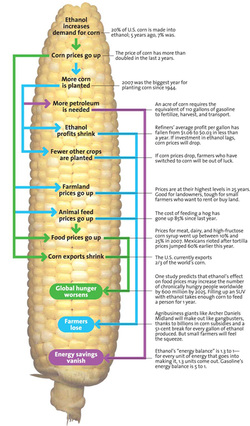
According to a study by Professor’s Pimental of Cornell and Patzek of U Ca., it certainly does not. One acre of corn yields 328 gallons of ethanol and there are 3 distillation steps required for a gallon of ethanol that contains 77,000 BTU’s (British Thermal Unit). A BTU has about the same amount of energy as a match head. In order to produce ethanol gasoline is used (which contains 116,000 BTU’s of energy). Overall, the cost to produce ethanol is 40% greater than gasoline. But wait isn’t a gallon of ethanol cheaper than a gallon of gasoline? The cost of a gallon of gasoline is about $3.44 nationwide and ethanol is $3.05. But wait, keep in mind ethanol has 1/3 less the BTU’s than gasoline and as a result, you will get poorer gas mileage. When the price of ethanol is adjusted for this, the cost is $4.02 (American Automobile Association website). In addition, the 3 distillation steps uses 98,000 BTU’s of gasoline for a net loss in energy of 28%, and up until January 1 of this year, the ethanol industry received subsidies of to $6 billion.


In 2005 for the first time, we heard the term agflation; i.e., inflation as a result of an increase in agricultural products, and it continues. In 2011, 37% of the corn crop went towards ethanol production.
Most everyone agrees that producing ethanol from corn is a bad idea. Why then do we still do it? The simple answer is that there are 39 states in the continental US that contribute to the commercial con crop. That is 78 votes in the Senate and numerous votes in the House of Representatives. They are not stupid. By voting against the mandate of producing ethanol from corn, that would lessen the amount of money that would flow to their constituents, and diminish their chances of re-election.
As a result of mandating the use of bio-fuels from corn, instead of making us less energy dependent on imported oil, we have become more dependent, increased our cost of living through inflation and actually increased the cost of energy.
Sounds like another good idea for term limits.
Now he tells us!

"It is not a good policy to have these massive subsidies for first-generation ethanol," Gore said at a green energy conference in Athens, Greece, according to Reuters. First generation refers to the most basic, energy-intensive process of converting corn to ethanol for use as a motor vehicle fuel additive.
 RSS Feed
RSS Feed
